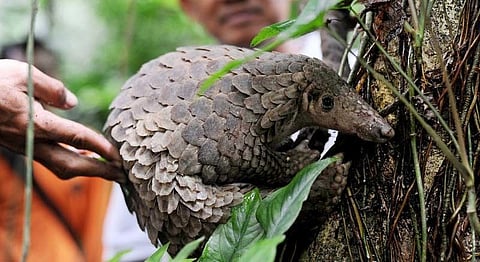
- HOMEGROWN WORLD
- #HGCREATORS
- #HGEXPLORE
- #HGVOICES
- #HGSHOP
- CAREERS
- ABOUT US
- CONTACT US

Pangolins are one of the most remarkable mammals on Earth. First off, they are covered in a thick armour of scales. These scales, which are made up of keratin, are the pangolin’s defence mechanism, as the creature can roll up into a ball, much like an armadillo, and rely upon its outer armour for protection. However, unlike an armadillo shell, a pangolin’s scales are so tough they can protect it from much larger predators, like, lions, tigers, and leopards. Yes, even a tiger’s sabre sharp teeth cannot penetrate these thick, protective plates.
A pangolin’s tongue can also be longer than its body, which makes sense when you consider that on average it collects 70 million insects per year. Yet these interesting details about this rare creature are eclipsed by the frightening fact that pangolins are the most trafficked animal in the world.
The little-known mammal supposedly makes up 20 percent of the worldwide animal trafficking market, threatening all 8 species with extinction according to the International Union for the Conservation of Nature (IUCN) Red List. The Indian Pangolin (Manis crassicaudata) is especially endangered due to its proximity to China, a country whose demand for traditional medicine has constantly pillaged India’s wildlife through poachers, tasked with the brutal harvesting of obscure animal parts. Due to archaic ‘medicinal’ practices still popular in China a pangolin’s keratin scales are the primary reason these critters are hunted down.
An estimate from The Telegraph puts the number at roughly 100,000 illegally captured pangolins per year, the majority being sent to Vietnam and China. Moreover, data collected in 2014 by the Environmental Investigation Agency, a UK-based NGO, puts forward, “3,500 pangolins are boiled alive in India every year (and about 10,000 worldwide).”
Unfortunately, boiling pangolins alive is a common practice in their poaching as this cruel procedure is the most efficient way of removing the scales of the animal. There is an unpleasant irony in that the pangolin’s greatest protector for thousands of years, its scales, are now the reason it faces the possibility of extinction.
Once the illegal animal byproducts reach their final destination they are typically dried and roasted or brewed into a tonic. In these forms, the ill-gotten scales are reportedly used as a treatment for palsy, rheumatoid arthritis, inflammation, asthma, cancer, and reproductive problems.
Why Pangolin Poaching Will Not Stop
The sheer scale of the scale business makes sense when the extent these products are coveted is recognized. Currently, prices vary from 600 USD per kilogram to USD 3,000 per kilogram on the black market. With such profits available this lucrative business almost ensures the extinction of the Asian Pangolin.
QUARTZ estimated in 2016 that “over the past five years, 4.7 tons of pangolin scales have been seized in India,” further citing, “where the pangolin is the most traded species.” The actual number of pangolins trafficked across India’s Northeast borders is suspected to be far higher.
The excerpt below, lifted from a more recent QUARTZ article, published in late 2017, fleshes out the dire situation by chronicling the recent seizures of pangolin scales in China:
“On Wednesday (Nov. 29), customs officials said they seized 11.9 tonnes (13.1 tons) of pangolin scales—the biggest seizure ever—from the port of Shenzhen, which borders Hong Kong, according to state media Xinhua. Officials said that the seized scales could have come from up to 30,000 pangolins. That is nearly four times the last record-breaking case, in which authorities in Shanghai seized 3.1 tonnes (3.4 tons) scales from close to 7,000 pangolins.”
Despite local and foreign efforts to curb China’s consumption of wildlife products, the dialogue often turns into a culture war. The battle is often uphill as the Chinese public is largely inculcated by the use of wildlife products, like, bear bile or tiger bone wine. Many Chinese farms are dedicated to harvesting by-products of wildlife species, such as bears, tigers, and rhinos. This wide availability both increases consumer demand and cloaks the actual number of poacher products entering the legal market.
In addition, China has the reputation of being the largest market for illegal wildlife products. Reputed environmental journalist and Wilson Center public policy fellow, Sharon Guynup, explained to New Security Beat exactly how much of a criminal epidemic animal trafficking really is.
“This $15 to $20 billion a year business is now the fourth largest source of criminal earnings in the world, after guns, drugs, and human trafficking operations… On the black market, rhino horn is worth more per pound than cocaine,” said Guynup.
Even though pangolin scales only make up a fraction of this enormous illegal trade, the demand and cash reward for it casts a foreboding shadow over the future of the rare critter. More so, the demand for traditional Chinese medicine has also extended its grim reaper like grasp to India’s slender loris as well as marine life, such as sea cows, sea cucumbers, and seahorses.
Despite the popularity and profitability of poaching Indian wildlife, raising awareness about the pangolin’s plight (as well as India’s many other endangered species) could perhaps curb the unchecked epidemic. India’s wildlife should not face extinction due to another nation’s obsession with a cruel and illegal trade that refuses to respect the preservation of rare species and the sanctity of international law that protects these remarkable creatures. That’s why you should spread the word as well as donate to the WWF.
If you liked this article we suggest you read:
